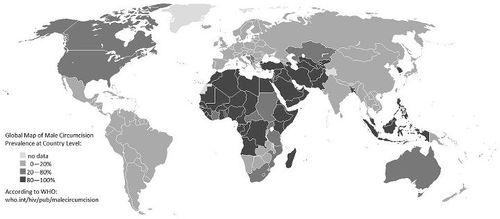Islamic circumcision
Islamic circumcision accounts for the great majority of all circumcisions in the world. The incidence of male circumcision reaches nearly 100 percent in the swath of Islamic nations that stretch from Nigeria in the west to Indonesia in the east.
Contents
Religious requirement
Though absent in the Qur'an, male circumcision is considered a religious requirement in Islam, and it is performed on male children of varying ages prior to puberty. Converts to this faith may also choose to undergo adult circumcision, but it is not always required.
Hossein Dabbagh (2022) questions the religious requirement for circumcision (khitan) in Islam.[1]
Psychological issues
Cansever (1965) administered psychological tests to twelve 5-to-7-year-old Turkish boys before and after Islamic circumcision and reported the results in her landmark paper, which was published in the British Journal of Medical Psychology in December 1965.[2]
Prescott (1975) argued that a decrease in sexual pleasure causes an increases in violence:
If we strive to increase the pleasure in our lives this will also affect the ways we express aggression and hostility. The reciprocal relationship between pleasure and violence is such that one inhibits the other; when physical pleasure is high, physical violence is low. When violence is high, pleasure is low. This basic premise of the somatosensory pleasure deprivation theory provides us with the tools necessary to fashion a world of peaceful, affectionate, cooperative individuals.[3]
De Mause (1996) argued that early trauma results in aggressive adult behavior.[4]
It is not clear whether the prevalence of Islamic and ritual circumcision causes a high level of violence in the Middle East.
The harm of circumcision
Male circumcision is harmful because it excises healthy tissue and permanently destroys beneficial, protective, immunological, sexual, and sensory physiological functions. Male circumcision also causes psychological problems that tend to perpetuate the cycle of abuse. Male circumcision is a costly diversion of medical resources away from beneficial services. Male circumcision violates legal rights, human rights, and ethical standards. Finally, we must remember that males are the more vulnerable and sensitive of the two genders and, therefore, deserve the greater degree of protection from traumatic, invasive, injurious,and unnecessary surgery. For all of these reasons the non-therapeutic circumcision of boys should not be performed and the genital integrity of all children should be respected and protected.[5]
See also
References
- ↑
 Dabbagh H. Is Circumcision “Necessary” in Islam? A Philosophical Argument Based on Peer Disagreement. J Relig Health. 24 August 2022; 61(6): 4871-86. PMID. PMC. DOI. Retrieved 18 July 2025.
Dabbagh H. Is Circumcision “Necessary” in Islam? A Philosophical Argument Based on Peer Disagreement. J Relig Health. 24 August 2022; 61(6): 4871-86. PMID. PMC. DOI. Retrieved 18 July 2025.
- ↑
 Cansever G. Psychological effects of circumcision. Brit J Med Psychol. December 1965; 38(4): 321-31. PMID. DOI. Retrieved 1 October 2023.
Cansever G. Psychological effects of circumcision. Brit J Med Psychol. December 1965; 38(4): 321-31. PMID. DOI. Retrieved 1 October 2023.
- ↑
 Prescott JW. Body Pleasure and the Origins of Violence. Bulletin of the Atomic Scientists. November 1975; : 10-20. Retrieved 27 April 2025.
Prescott JW. Body Pleasure and the Origins of Violence. Bulletin of the Atomic Scientists. November 1975; : 10-20. Retrieved 27 April 2025.
- ↑
 De Mause, Lloyd. Restaging Fetal Traumas in War and Social Violence. Pre- and Perinatal Psychology Journal. 1996; 23(4): 344-92. PMID. Retrieved 27 April 2025.
De Mause, Lloyd. Restaging Fetal Traumas in War and Social Violence. Pre- and Perinatal Psychology Journal. 1996; 23(4): 344-92. PMID. Retrieved 27 April 2025.
- ↑
 Hill G. The case against circumcision
Hill G. The case against circumcision  . Journal of Men's Health and Gender. 2007; 4(3): 318-23. Retrieved 22 April 2025.
. Journal of Men's Health and Gender. 2007; 4(3): 318-23. Retrieved 22 April 2025.
